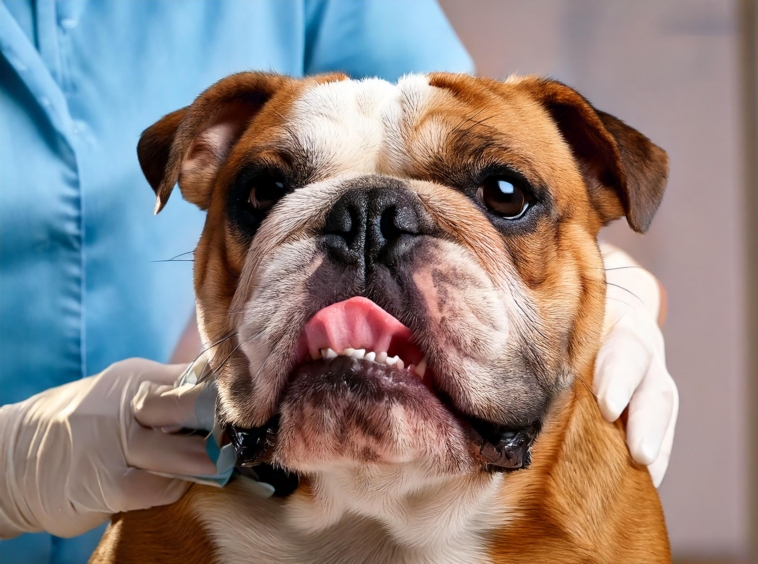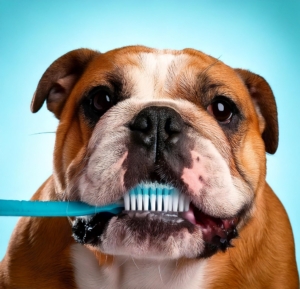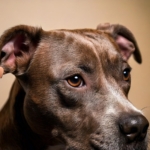Last updated on October 24th, 2024
Here’s an overview:
Introduction to the Dental Requirements of Bulldogs
The Benefits of Having a Routine Vet Appointment
Selecting the Best Toothbrush and Toothpaste for Bulldogs
Recognizing The Need For Consistency While Brushing
Recognizing and Treating Common Dental Disease Occurrences in Bulldogs
Impact of Nutrition on Dental Health in Bulldogs
Use Safe and Efficient Dental Chews and Toys
Scheduling Professional Dental Cleanings for proper care of Bulldogs
Recommendations for Improving Oral Care in Bulldogs
Introduction to the Dental Requirements of Bulldogs
The dental architecture of the bulldogs is quite different from rest of the dogs as they are not only brachycephalic (having a short-nose) but also undershot. Such an anatomy is often associated to the following:
- Crowded teeth where proper cleaning is compromised igniting the chances of plaque build up.
- Skewed teeth which causes abrasion in a large area of the tooth.
- Large gum pockets that are capable of trapping food and bacteria, resulting in periodontal disease.
- Difficulty in mastication that would minimize the effect of chewing of rough food on the cleaning of teeth.
- Increased chances of intra-oral infections leading to deep creases at the curvature around the mouth and the gums.
These factors should be well comprehended in order to provide effective treatment in a more individualized manner.
The Benefits of Having a Routine Vet Appointment
One of the important things that must be taken care of is a bulldog’s dental part which can effectively be done only through periodic veterinary visits. A vet can help prevent common problems like plaque, gingivitis, or tooth decay from worsening. These routine check-ups allow possible professional cleanings to be completed which will help eliminate the chances of serious dental issues arising.
- Early Detection: Early recognition of potential dental problems.
- Professional Cleaning: Tartar and plaque deposition that may not be cleaned with normal brushing.
- Preventative Care: Practical tips for practicing good oral and dental health activities.
- Overall Health: Treatment of bulldogs involves taking care of the mouth as it integrates other health of the bulldog is affected as well.
Routine visits serve to help in maintaining dental health of your dog thoroughly.
Selecting the Best Toothbrush and Toothpaste for Bulldogs
It is important to pick the right toothbrush and toothpaste for the bulldogs. Consider the following points:
- Toothbrush: Use soft-bristled dog toothbrushes for dogs. Make sure the brush has a smoothness for the back teeth on the brush. To improve control in hard to reach areas, finger brushes are useful.
- Toothpaste: Use only the toothpastes made especially for dogs as other compositions fit for humans might cause harm. Choose flavors such as poultry or beef in order to make aggressive brushing amusing.
- Size: both the brush and toothpaste should be gentle to any bulldog’s mouth and skin.
Recognizing The Need For Consistency While Brushing
Bulldogs are susceptible to several dental diseases and it is on this background that brushing should be done routinely. Most preferably Regular brushing of bulldog teeth should be accompanied with a canine toothpaste and toothbrush. I will outline a few steps:
- Timing: Try to brush more than 2 times per week. Start with at least 1 to 2 times at 2-3 times per week.
- Socialization: For the first time, you should give him a tooth brush.
- Procedure: Circular movements are recommended while both the tooth and gum are in contact with the cleaner.
- Signs: There are many symptoms, but the most common ones are bad breath or gum bleeding.
Recognizing and Treating Common Dental Disease Occurrences in Bulldogs
Bulldogs are predisposed to many dental problems caused by their odd-shaped jaws. These include:
- Plaque and Tarter Accumulation: This necessitates routine removal through brushing or cleaning.
- Gingivitis: This is a condition characterized by inflammation of the gums resulting in plaque, and untreated can lead to the progression of the disease and other consequences.
- Dental Cavities: Be alert to observe any cavities or traumatized teeth.
- Displaced Teeth: Such teeth are quite common among bulldogs and some may require realignment.
- Halitosis: Bad breath is often the cause of other dental problems.
It is always useful to perform examinations regularly to ensure there is no advancement in disease. Make it a habit to keep your dog’s mouth clean and make regular visits to the vet for further prevention of any complications.
Impact of Nutrition on Dental Health in Bulldogs
For effective maintenance of a Bulldog’s dental hygiene, proper care and balanced nutrition is very essential. Such nutrients are said to maintain and promote healthy teeth’s and gums hence lowering plaque accumulation.
- Top Quality Dry Food: Kibble serves as a mechanical tooth scrub as the dog chews on it.
- Wholesome Chews: These will assist in preventing the development of plaque and tartar deposits. They are raw bones and dental chews.
- Sugary Treats: These should not be used because they are detrimental to teeth and the gums since they contain a lot of sugar.
- Make Use of Dental Supplements: Enzyme-containing additives can dissolve the plaque.
Making sure someone sticks to a proper nutrition can make chronic inflammation very rare among the bulldogs.
“Ensuring a nutritious diet can significantly affect a Bulldog’s dental health positively”
Use Safe and Efficient Dental Chews and Toys
Apart from Bulldog breeds due to their skull size, such as bulldog, dental chews and toys are always necessary for promoting oral hygiene in dogs, they facilitate the elimination of excess plaque and tartar and offer mental stimulation.
- Use Only Vet-Approved Products: Dental chews and also toys should contain the approval of a veterinary doctor regarding its safety and other effectiveness features.
- Wrong Materials: Use of durable non-toxic materials ensures reduction of choking risks, as well as possibilities of dental damage.
- Jaw Size and Chewing Strength: Buy suitable items for bulldogs jaw size and chewing strength.
- Replacement and Disposal: Look after and throwaway if worn out or broken chews and toys.
- Usage of Monitoring: Supervised playtime ensures no small bits are ingested.
Scheduling Professional Dental Cleanings for proper care of Bulldogs
Chronic professional dental cleaning also plays an integral part in maintaining bulldog oral hygiene and care. Bulldogs are prone to plaque and periodontal disease as other bulldogs are. Such owners are asked to observe these directions:
- Frequency: Schedule approximately dental cleanings every 6 months.
- Veterinarian Selection: Do not choose a veterinarian that has never worked with bulldogs.
- Preparation: It is important to determine the health status of the bulldog before giving anesthesia.
- Post Cleaning Instructions: Observe instructions from the vet regarding the post-cleaning care procedures.
- Signs of Problems: Indicators of trouble include halitosis, loss of appetite, or inflammation of the gum tissue
Due to their troublesome susceptibility to dental disease, bulldogs must receive professional cleanings at regular intervals in order to maintain a healthy mouth.
“Brushing is essential to prevent tartar buildup and keep your Bulldog’s mouth healthy”
Sustaining and Alleviating Pain and Discomfort
Owners ought to keep lookout for any signs of potential pain or discomfort from their Bulldogs’ mouths. An in mouth examination is also needed every now and then to note presence of:
- Presence of red or swollen regions of the mouth
- Any loose teeth or broken teeth
- Any sanguineous discharge
- Abrasive chewing and eating pattern
Bulldog owners should seek immediate medical assistance when either of these conditions is noticed. Major types of pain management may include:
- Pain-Relieving Drugs: These can be prescribed but only on the recommendation of the vet.
- Salt Water Rinses: Rinse the affected parts with warm salt water.
- Special Feeding Regimes: Soft food so that chewing hard food is not troublesome.
Caring for Bulldogs makes it possible for them to have good oral hygiene as well as overall normal health through close observation and rapid intervention.
Recommendations for Improving Oral Care in Bulldogs
- Brushing the Teeth: Using dog toothpaste and a soft-bristled toothbrush, brush your dog’s teeth at an appropriate time each day.
- Vets under contract / control of the Government: Help in treating deeper phlegmons thus providing for dental checkups and cleanings every year.
- Chew Terrys: Offer suitable chew terry’s to assist in the weight loss by getting ot of plaque and tartar in a convenient manner.
- Proper Nutrition: Optimize your dog’s nutrition by feeding it a quality diet, training and healthy dog food so that it can have strong teeth and gums.
- Periodic Evaluation: Continue performing periodic mouth evaluations at home aimed at discovering such signs as foul smell from the mouth, inflammation of the gum or even mobility of teeth.
Article by: Dr. Sajawal Amin ( Deep Researcher )





